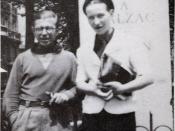Jean-Paul Sartre belongs to a group of philosophers known as existentialist. The basic belief of an existentialist is a person has personal freedom and this practical total freedom gives them a responsibility. Existentialist stress that you cannot understand the human condition by imposing rational categories, or trying to systematically label human actions. By doing this they believe they set up standards which cause them to contradict them selves, and never allow them to encounter the entirety of the individual. To avoid the paradox of freedom Sartre refers to freedom as the "condition of human existence"� rather than a "characteristic of human nature"�, without this clarification we would become slaves of the concept of freedom thus making us no longer free. The human freedom is shown by our basic human nature one of creativity, individual choice, and seaming spontaneous decision making capabilities. Sartre stresses there is no possible way to avoid your freedom of choice.
The belief of a fictitious god to guide your choice, or even the act of not choosing then becomes your choice.
While not all existentialist totally reject religion Sartre and others such as his associate Simone de Beauvoir have no place for religion in there theory of the human condition. They believe that it is self-deceptive to base your decisions, or try to escape the burden or reality of your choices through the beliefs of supernatural powers. Without god everything is possible, and without the ability to cling to the thought of supernatural powers there is no entity for man to blame. To make sure that their views are not over looked existentialism avoids over stressing the atheistic view and states that if god were to exist it would not change anything about their theory. A true Sartrian is only by the ideal they create for...


